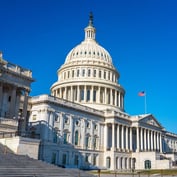Washington
The congressional panel overseeing the Troubled Asset Relief Program is asking the government to justify its decision to bail out American International Group Inc.
A TARP Congressional Oversight Panel majority today has released a report that questions why the government is infusing capital into AIG and other financial institutions rather than using the normal liquidation and receivership process already in place.
“Six months into the existence of TARP, evidence of success or failure is mixed,” the panel majority writes.
In addition to drawing on the $700 billion allocated to Treasury under the Emergency Economic Stabilization Act, economic stabilization efforts have depended heavily on the use of the Federal Reserve Board’s balance sheet, the panel majority warns.
“The total value of all direct spending, loans and guarantees provided to date in conjunction with the federal government’s financial stability efforts (including those of the Federal Deposit Insurance Corporation (FDIC) as well as Treasury and the Federal Reserve Board) now exceeds $4 trillion,” the panel majority writes.
The panel majority is highly critical of the government decision not to disclose promptly and in detail payments made to AIG counterparties through government funds.
This decision, the majority says, “has substantially hampered oversight of the TARP program by Congress and, equally important, has impaired the understanding of that program by the American people.”
Meanwhile, TARP subsidies “carry a risk of obscuring true valuations,” the panel majority writes. “They involve the added danger of distorting both specific markets and the larger economy. Subsidization also carries a risk that it will be open-ended, propping up insolvent banks for an extended period and delaying economic recovery.”
The panel majority does not come to conclusions about whether the current approach is appropriate.
“The actions undertaken by Treasury, the Federal Reserve Board and the Federal Deposit Insurance Corporation are unprecedented,” the panel majority writes. “But if the economic crisis is deeper than anticipated, it is possible that Treasury will need to take very different actions in order to restore financial stability.”
By assessing the Treasury Department’s current approach and discussing alternatives, “the Panel hopes to assist Congress and Treasury officials in weighing the available options as the nation grapples with the worst financial crisis it has faced since the Great Depression,” the panel majority writes.








 April 07, 2009 at 08:00 PM
April 07, 2009 at 08:00 PM










